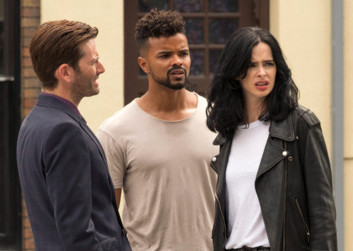Jessica Jones Season 2 Review
In 2015, Netflix seemed to be showcasing the true extent of Marvel’s capability. Daredevil started things off with a strong first season that took us into a grimier, grittier and more mature version of the MCU that we had never seen before. Jessica Jones was an equally strong follow-up with its unique take on abuse, alcoholism and sexual assault.
When it was on its game, it was brutal, smart and efficient in presenting a woman who didn’t want to be a hero. When it wasn’t, which did happen in its second half, it suffered from many of the same faults that permeate all the Marvel shows that have followed it: pacing, drive and an inability to maintain season-long storylines well. In 2018, Jessica Jones is back for a second season. With no mentions of The Defenders, no Killgrave or Luke Cage, how does it fair?
There’s rarely any anticipation, even as the characters are frequently put into tense situations
The short answer is that Season 2 of Jessica Jones is okay. It doesn’t improve on the problems the first season had and, in some cases, it makes them worse. That said, it dives into exciting new territory that nothing in the MCU has taken on before. When it’s good, it’s solid. When it’s bad, it is a slog to get through. The first problem is the pacing which, to varying degrees, afflicts every MCU show. The first half of this season is particularly slow, and when we, as an audience, discover what it was all building to, the reveal doesn’t justify the amount of time spent getting there. While it does pick up in the second half, it still doesn’t feel like it’s building to anything. Instead, what we get feels more like a series of incidents that are dealt with and forgotten with little emotional pull. Even when the characters are put into tense situations, there’s rarely any anticipation, which makes it a long haul to watch.
Granted, this season also isn’t as straightforward as the first. In Season 1, the show was clearly defined by Jessica trying to stop Killgrave. Season 2 is far less established, with the first half being an investigation and the second half reckoning with the findings and how they impact the characters – which they do immensely. When the show investigates the characters and the implications of what has happened to them, it’s at its most potent. But it doesn’t do that enough, resulting in a season that is average but had the potential to be massive.
Her performance sells the character’s development
Regarding performances, Krysten Ritter is easily the best part of this series. Her performance is layered and particularly engaging when hinting at Jessica’s vulnerability. The season spends a great deal of time examining her origins, how she became the woman she is and, while sometimes it oversteps, with tragic flashbacks that have never before been an issue or even mentioned, her performance sells the character’s development. Rachel Taylor does well as Trish but suffers from an incoherent story arc. Her envy of Jessica’s ability to help people is never explored in detail, resorting instead to new forms of addiction that overtake the drama of what was already there. It also doesn’t help that she has a boyfriend of five episodes who never shows up again, making his screen time seem incredibly wasted.
Eka Darville, who plays Malcolm on his journey escaping addiction and becoming an actual player in events, is welcomed. He also works as a reliable voice of reason and humanity in a show that desperately needs grounding to reality. Out of all of the performers, however, the one who has the most satisfactory arc is Carrie Ann Moss’ Jeri Hogarth who has a revelation early on that completely shatters her worldview and forces her to fight for what’s hers. There are moments that are extremely tragic and horrifying but compelling as we see her struggle and succeed. Many of the other characters are left floundering with their various addictions for most of the season.
At the cost of thrills and pacing, it works as an effective character study
Season 2 is brighter than the first with much more daylight, and visually it’s on the same level as the first, though it doesn’t have the same flair as Daredevil. The new characters also work well in helping the season look into how Jessica is perceived and the way in which others like her are treated: often with fear and mistrust. In the early parts of this season, the focus is simply to show how Jessica’s powers impact her life and how what she went through has happened to others. At the cost of thrills and pacing, it works as an effective character study.
The second half features an interesting relationship between two characters that never truly takes off, but has moments of greatness within it and does go into discussions of what it means to have powers that no superhero show has gone into yet. Underlying the entire season, however, is a missing spark. The first season had David Tennant’s Killgrave, who, when well scripted, gave the show an electric charge to push the audience through its slower moments. Season 2 doesn’t have him, and in doing so, lacks the charge needed to remain captivating for its entire runtime.
Ultimately, Season 2 of Jessica Jones is an okay Marvel TV season. It’s not as bad as Iron Fist, but it’s disappointing after Season 1. By the end, the characters have come a long way and the ending is somewhat satisfying, but it’s a long drag to get to that point.

Comments